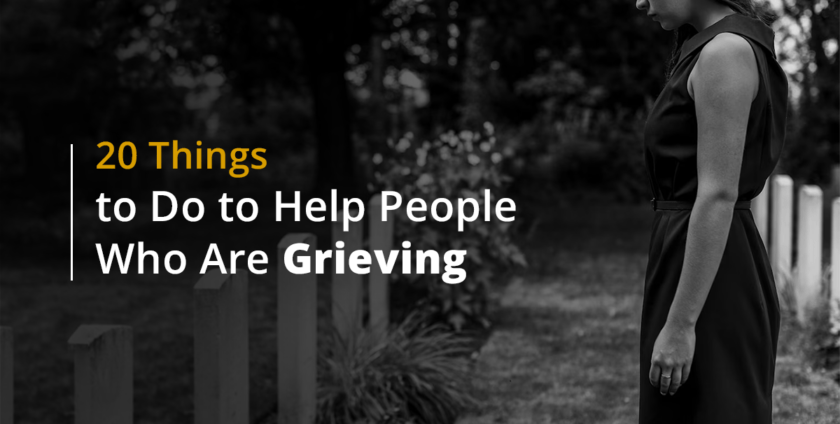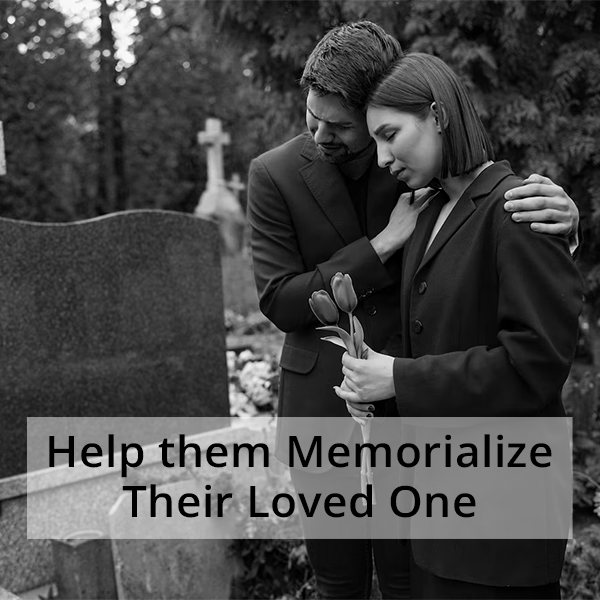20 Things to Do to Help People Who Are Grieving
- By: Rahul Dev
- Category: Health News, Monuments
- 0 comment

When we lose a loved one, lives don’t just disrupt but change forever. When someone we care about experiences the death of a dear one, we often struggle to find the right words to comfort them in the grieving process. We might not be able to take away their grief, but that does not mean we cannot do anything to offer comfort and support. Little things like your presence can mean a lot to them.
Besides being there for the person, there are numerous small gestures that you can do to help the one grieving in the long run. If you are searching for how to help a grieving friend, this blog is for you. Below we have discussed 20 things you can do to help a bereaved person with their grieving process while respecting them and their boundaries.
How to Help Someone Who is Grieving?

We cannot undo what has happened, so first, we need to accept that we can’t fix the situation and make the bereaved person feel better instantly. So, here are some things you can do to make the pain of losing someone close manageable.
Show Up

One of the simplest yet effective ways to extend support to someone is by showing up. Your mere presence can often be of significant help to the person grieving a loved one’s loss. Additionally, if you sense you are getting in the way or feel the bereaved need more space, it is better to leave quietly. You can always call them or leave a message to check in the other day.
If You Can’t Visit, Call or Text
If you cannot meet a bereaved person physically, it is always nice to give them a call or text. Knowing that people care and keep the deceased in their thoughts and prayers during such difficult times is often comforting. People usually hesitate to reach out, assuming they don’t want to remind people of their loss or don’t know exactly what to say. But these small gestures are what go a long way.
Be a Good Listener
If there’s a situation where one should be a good listener, this is the one. It is the best thing you can do when talking to some grieving. Try to speak as little as possible and listen. You can assure them it is okay to feel what they are feeling right now, and it’s okay to talk about it. Even though we cannot erase or lessen the bereaved’s pain, we can offer comfort by being good listeners.
Acknowledge How Bad It Is
People who are grieving often feel relieved when others agree that the passing of their loved one is devastating. They feel seen when their emotions are acknowledged. So, instead of saying phrases such as “It’s not that bad,” “It’s God’s will”, or “They are longer hurting and are in a better place”, be honest with them. Help them accept that it is hard and tell them they’re strong to overcome this eventually.
Accept Their Mood Swings

Grief is tough to process, and the person might feel a roller coaster of emotions. People constantly have ups and downs. They may look fine one moment and be overwhelmed with emotions the next. So, be prepared for their mood swings, as everyone has a different take on overcoming the loss of a loved one. Try and offer support throughout, even after they feel much better.
Understand & Respect Their Way of Grieving
There is no right or way to process grief. The sadness caused by the death of a loved one is universal; however, everybody deals with it differently. Understand your friend’s way of mourning and respect it. Some may be ready to discuss their feelings, while others may take their time. The most important thing is to be there with them as their support system, regardless of how they mourn their loss.
Don’t Just Focus on the Good
Talking about the positive memories of the deceased is a good thing. For instance, saying, “They were so loved,” or “They lived a fulfilling life,” or something along the same lines is okay but don’t make it excessively optimistic or cheerful because it is just not the right time. When talking to a bereaved person, they often think of bringing up positives and are not wrong. One must pick the right time to do so.
Don’t Compare Their Grief with a Different Situation
It’s an instinct to start comparing something similar you must know about from a few years ago. But comparing two situations is never a good idea, especially when dealing with the death of a loved one. Refrain from saying things like, “It could be much worse”, and comparing their loss with someone else’s. Telling them that people have had it worse undermines their pain, implying their grief is smaller.
Don’t Share Your Story
You may have suffered the same kind of loss that your friend is going through right now. You might want to share your story to comfort them; however, there are better times to do so, but not now. Let the difficult time be all about the deceased and the people grieving; now is not the time to pile on the loss, compare, overshadow, or outdo it with your own grief story.
Say the Deceased’s Name

When communicating with the deceased’s family members, people often hesitate to mention the departed’s name. People use “they”, “he”, or “she” to address them, thinking that taking their name would worsen their grief or remind them of their loss. Whereas it is the other way around. When speaking to your bereaved friend, mention the name of the person they are mourning because sometimes they long just to hear their name.
Avoid Giving Advice
You may mean well when offering advice, but the bereaved person might not take it well. Advising what they must and must not do can worsen the mourning person’s situation. They might end up feeling pressured to do something to overcome their grief even when they don’t feel ready. Instead, acknowledge how huge their loss is. For instance, you can say, “It must be a hard time for you and your family’.
Refrain from Explaining the Loss
Sometimes, things we say to console a mourning person might have the opposite effect on them, especially when trying to explain the loved one’s loss. It is better is avoid saying things like, “Everyone has to go one day”, “Thank god they are no longer suffering”, or “They are at a better place now”, etc. That’s why listening is better; listen to them sincerely while they share their grief with you.
Don’t Persuade them to Talk about it
Everyone opens differently after suffering a loss. A person might start sharing how they feel the next day of the deceased’s death, while the other might take several days or even months. In such cases, it is better not to persuade the latter to share their emotions when they are not ready. The best thing is to let them know you are here for them if they need anything.
Know What to Say to the Person Grieving
It’s natural if you struggle to find the right words to say to a bereaved person. In such situations, simple words are the best to show and extend your support. You can say something as simple as, “I feel sorry for your loss. How can I help?”. You might feel uncertain about this by not communicating more, but your sincere actions to aid can significantly console the mourning individual.
Offer Practical Help

When dealing with loss, carrying out everyday tasks or running errands can seem challenging. Offering practical help to the bereaved is one of the best things you can do. Instead of saying, “Let me know if you need any help”, offer practical help with daily chores whenever possible. For instance, you can offer to help buy groceries, babysit, make phone calls, prepare meals, mow lawns, watch their pets, do laundry, etc.
Watch for Early Signs of Depression
It is usual for a grieving person to always feel sad; however, if the signs do not fade away or get worse with time, it is a possibility that the sadness has transformed into something serious like depression. So, it is essential to keep an eye on these symptoms and encourage your friend to seek professional help if you think they might need it. Such conversations can be difficult, but you can initiate them by stating your concern.
Offer Them to Connect to Someone Going Through Something Similar
If you know someone who might be suffering the same kind of loss, you can offer to connect with them. They can always say no if they don’t want to, but talking to someone going through a similar loss can help a lot. People who have lost a loved one might offer better understanding and support than others. You can suggest a person in particular or even link them to a community.
Provide Ongoing Support & Stay Connected
Healing from loss is not linear; it comes with ups and downs. Bereaved people need time to heal, and the suffering of loss comes and goes. So, be patient and be there even when the mourning person starts to feel better. Let them know that you will often call or drop a message to check in on them. They might not always pick up your calls, but knowing someone is looking out for them is comforting enough.
Find Your Way to Show Love
Everyone has a different love language, and it’s only sometimes verbal. If you want to comfort your suffering friend, find out your way of showing them love. You may hug them quietly, hold their hands when they cry, make their favorite meal, bake cookies, give them flowers, a ticket to a movie to cheer them up, book them a relaxing spa, get them their favorite author’s books, and so on.
Help them Memorialize Their Loved One

After a person passes away, there are numerous decisions that a family needs to make, like funeral arrangements and commemorating the departed with a gravestone. Memorializing a loved one’s death through granite headstones is not just marking their death but is remembering, recognizing, and honoring their life. Besides paying tribute, it helps those mourning a loss, allowing them to come to terms with it and serving as a source of peace.
Don’t worry if you don’t know what to say or do in these trying times to the bereaved to comfort them. If you wish to help them commemorate their loved ones, Stone Discover offers headstones, memorial plaques, granite monuments, and more.
There is great importance in permanent memorialization that will be preserved intact for generations! It is natural to get confused in such situations; if you have good intentions of helping them, everything will turn out fine.
- By: Rahul Dev
- Category: Health News, Monuments
- 0 comment

Leave a Reply
You must be logged in to post a comment.